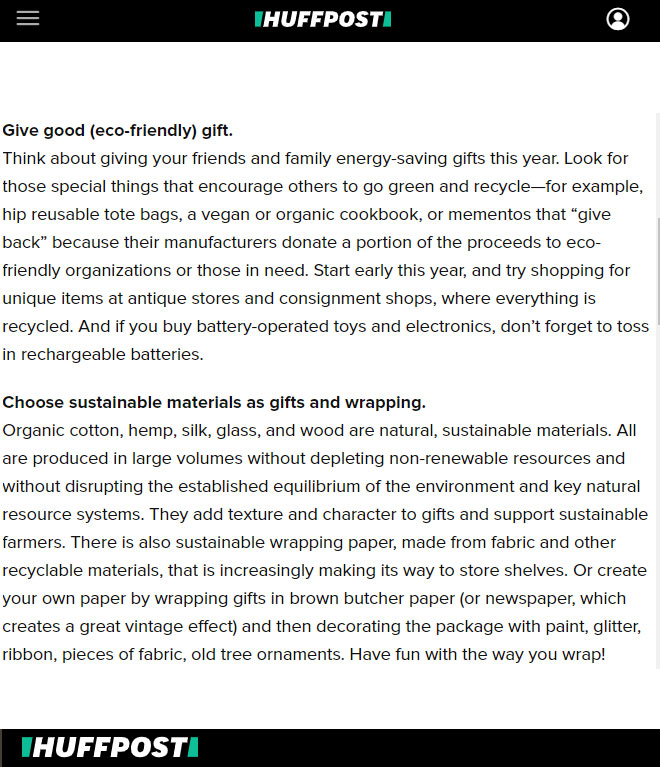6 Simple Steps to Advocate “Going Green”
By Rachelle Carson-Begley
Whether I am at my manicurist, running around the grocery store, or socializing at some upscale Hollywood function, men and women alike often bump into me (or me and my husband, Ed Begley Jr.) and ask if we have any pointers on “going green”—either on a personal or global scale. People love the concept in theory, but seldom know how to execute it.
I have found that the number one way to advocate for change is to voice your opinion. Easier said than done. But the truth is, if you don’t let companies know that you’d like greener alternatives in their products and services, do they really have any incentive to change? The business world is driven by supply and demand, so you must create that demand for a greener world. You may not be able to change the world overnight, but you can make a difference over the long term. Here’s how:
Write to your congressman (or -woman).
Writing to your congressman or -woman, or any other elected official, isn’t as hard or time-consuming as you might think. For local issues in your community and state, you almost always want to write to someone who represents you directly. Almost every government branch and agency has a website; for federal representatives, http://www.govtrack.us has an interactive map setup to help you figure out what district you are in. Often, your local library can help. Once you find out who to write to, send them an email and tell them how you feel. Be specific and concise about what you want to change (and be polite). And follow up.
Write to the biggest offenders.
These are the big companies that, to your knowledge, don’t have a green alternative to their best-selling product or aren’t making mainstream efforts to use biodegradable or organic products. Whether you are interested in healthier, greener packaged goods, consumer products, or clothing, or simply a green way of conducing business, there are corporations that need to know you want to see a change. You can also make an impact by doing research and delivering facts—rather than just your opinion, facts substantiate your claim and are more likely to effect change.
Contact the companies that Do the Right Thing.
Conversely, write to companies that either having a green line of products or are based on eco-consciousness as part of their mission statement, and tell them they aOnlinere doing a good job. Tell them you support them in their efforts to leave a minimal carbon footprint. Tell them what you love about their products. Tell them why their products are important to you, and what you’d like to see in the way of line extensions.
Use social media to create a ruckas.
If you are fed up with a company or product, or (conversely) you admire a product, why not give a shout-out to your followers via twitter or Facebook? Never underestimate the power of your 50 or 500 or 5,000 followers. Ask them to repost and retweet. Make a video and post it on YouTube. You never know if it will go viral. Be creative. The power of the internet speaks volumes and you can take your “campaign” to whatever level you like (or are inspired to go).
Don’t go it alone.
You know the old saying? There’s power in numbers. Some people don’t know where to start, are too intimidated, or just can’t get motivated. There’s no judgment here—personally, I met Ed at a Friends of the River fundraiser and it changed the course of my life. I had just taken a trip down the Kern River and wanted to give back to this nonprofit organization that cleans up California’s rivers, so I volunteered at one of their big fundraising events where Ed was the MC. So, if you need support (or, more likely, a kick in the butt!) join an organization with some like-minded people. Go to a fundraiser. Attend a local eco event with a friend. Or keep it on the down low and contribute some empty plastic water bottles to your child’s school’s recycling program, where you’ll meet other like-minded parents. Speaking of which . . .
Start a start-up.
Does your child’s school have a recycling program? Start one! Does your neighborhood have a collective garden? Talk to your local representative about zoning laws and how you can establish one! Is there an Environmental Awareness Day at your workplace? Talk to Human Resources about creating one. (You may be able to begin by placing a recycling bin in the lunchroon if there isn’t one there already, and you can practice “nonvoilent demonstration” by casually tossing your empty water bottle into the bin during idle chit-chat with your neighbor at the water cooler.)
Make a change that only you know about—and then tell a friend.
This is where it gets personal. I’m talking about buying the organic alternative at your grocery store, purchasing a skin-care cream that isn’t laden with chemicals, choosing to shop at a thift store instead of buying the new version, refusing to buy or use plastic bags no matter what; trying out a green product, such as a bathroom cleaner, instead of the one you’ve been using for years. If any of the aforementioned has worked for you on any level, and if you’re so inclined, tell a friend. And coach them on how they can do it, too, The enviroment will thank you.

Actress, speaker, and author Rachelle Carson-Begley is one of the most recognized names and faces in the environmental world of Hollywood. To learn more about her and her tips for an eco-friendly world, visit www.rachellecarson-begley.com.





